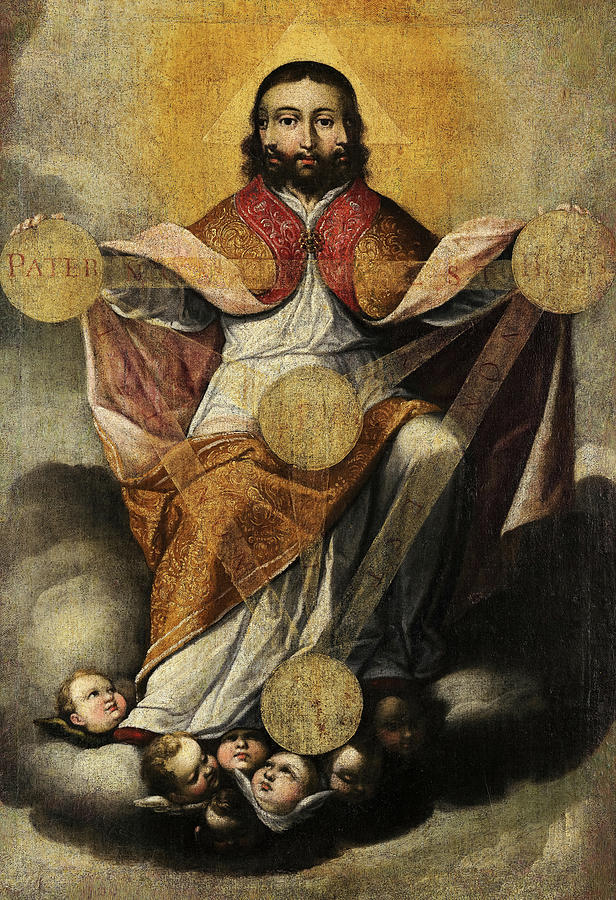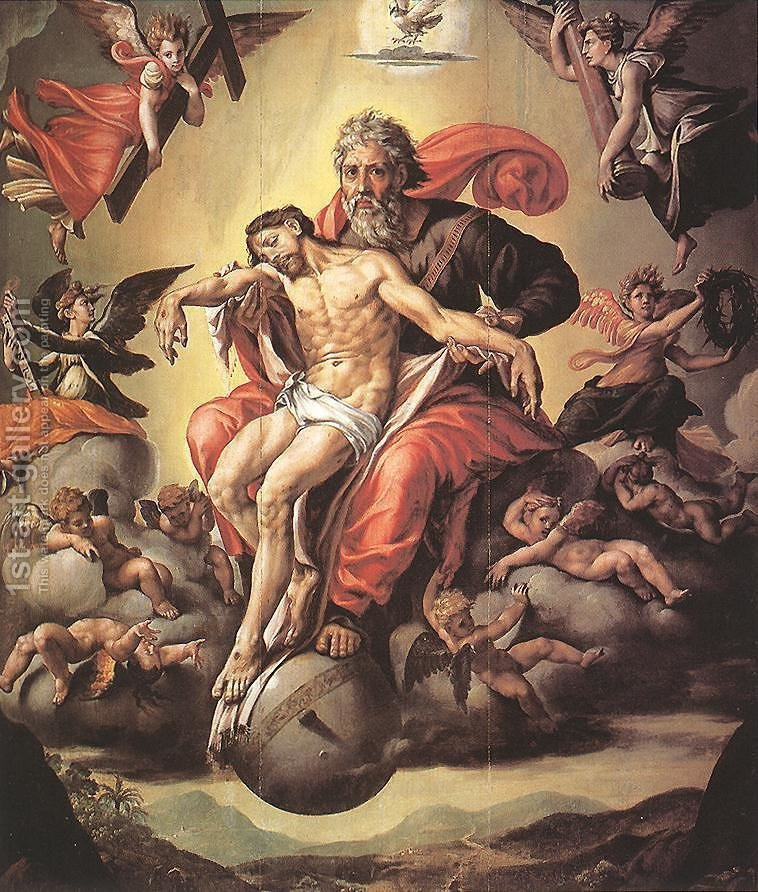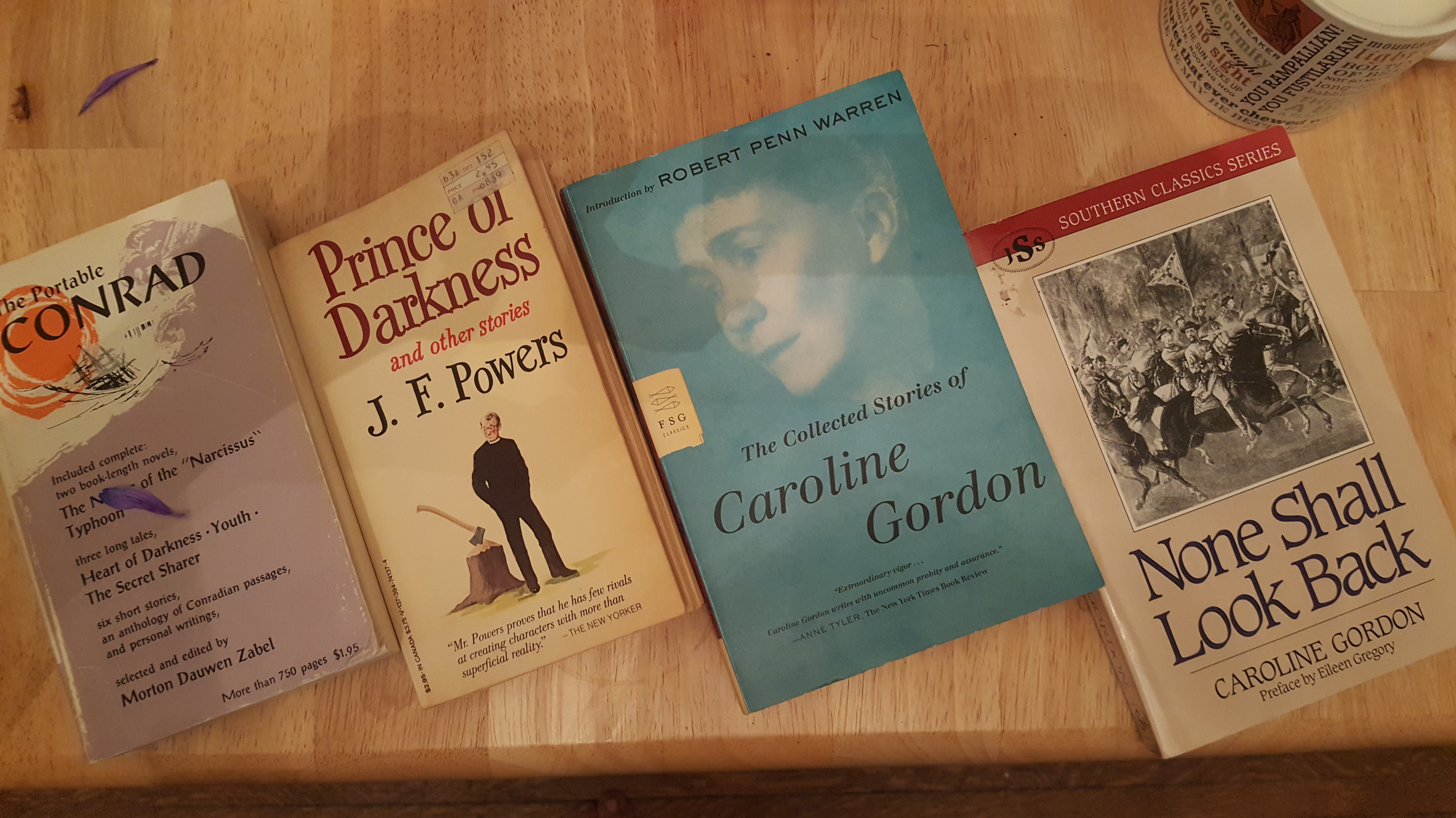For some reason for the last several months I’ve been rather overwhelmed when trying to think of a thing to comment on and how. I don’t want to publicly say much politically, again, for some mysterious reason, and it was hard not to get political. BUT here I am again, and to start things off I’m just going to post a super nerdy, ridiculous, probably interesting to exactly no one, overly-long essay I wrote for my theology class last semester. It’s about the Trinity. And, shockingly, this is the edited and significantly cut back version. Also, I got an A on it, but I should probably note my professor was struck down with the Rona when he graded it, sooo… anyway. Here it is.
*ahem*
Attempted Thot on the Trinity, by Sammy B.
In The Light of Christ: An Introduction to Catholicism, Thomas Joseph White, OP concludes his chapter on the Trinity saying, “The Trinitarian faith is not a secondary aspect of Christianity, but is the summit and source of all the rest. This truth casts perspective on everything else, and allows us to ‘interpret’ reality from a most ultimate vantage point.”[1] In this essay, I will attempt to approach this “most ultimate vantage point” and explore what the interpretation of reality from such a place means.
Much of the work of evangelization is overcoming and correcting fundamental misunderstandings.[2] In the chapter at hand, White walks us through the true, ancient teaching of the Church regarding the nature of God as three persons in one divine nature. He makes it clear that the Trinity in no way contradicts the monotheism of the Old Testament; there is still only one God, the same One who first revealed himself to the Jewish people as the Creator and I AM, who then more fully and clearly revealed Himself in His Son Jesus Christ, who, before Abraham was, simply is. At the same time, White explains, each of the three divine persons are distinct, “the Father is not the Son or the Spirit, the Son is not the Father or the Spirit and the Spirit is not the Father or the Son,”[3]; “the Father always gives all that he is to the Son without in any way being diminished in his own plenitude, and he and the Son with him give all that they are to the Spirit, in a communion of eternal love.”[4] In other words, there is nothing in any of the persons of the Trinity that is not fully in the other two as also the One God. They are definitely distinct, yet always united in being and action. Creation, Redemption, Sanctification happen through all three persons in one. Anything God does, He does as Father, Son, Holy Spirit.[5]
How can this be? How can something be distinctly and definitely three yet ultimately and really one? White admits that this may look like a “complex conceptual game.”[6] Is it intentional obfuscation- as the Jehovah’s Witnesses and Mormons claim- intended to confuse and thus maintain power over an ignorant people? That God would allow such widespread and enduring fundamental error in His Church from the very beginning is obviously absurd. It also seems extremely unlikely that a completely fraudulent church would be the single longest lasting institution[7] in the history of the institutions, given how short-lived other cons tend to be.[8] Further, as in any theological reflection, White is essential to always go back to and stay with the revelation of the Trinity that is Christ Jesus, the Incarnate image of the Father Who sends His Spirit to his disciples. As White puts it, “From the Cross, Christ crucified who comes forth from the eternal Father sends the Holy Spirit who is love upon the world.”[9] In knowing and loving Christ more deeply, we can better understand and love the Trinity.
So, with Our Lady, we accept this deepest mystery of God’s identity as true but still ask, “How can this be?” For while the distinction in persons based on procession and relation make sense, it’s still not quite clear what it really means or looks like. If this is, as White says above, the most ultimate vantage point and “the single most practical truth for human beings,”[10] the more tangible we can make this ineffable mystery, the better.
In his De Trinitate, books IX and X, Augustine explores the mental image of the Triune God in man. Love, he argues, requires three: the lover, the love itself, and the loved. In the mind loving itself, however, the lover and loved are the same one thing, so you are left with the mind and its love. “Love and mind, however, are not two spirits but one…and yet they are two somethings, lover and love…And these are called two things relatively to one another.”[11] The mind does not love itself with any thing other than its own spiritual self, but there still must be two ‘somethings’, for otherwise the relation of love (relations need more than one) would not be possible. Likewise with the mind knowing itself; there is the mind and its knowledge, which are two somethings- you wouldn’t say the mind is knowledge- but one inseparable being that is both doing the knowing and being known.
This act of the mind knowing and loving itself is different from knowing and loving other things; it is not the case that the mind sits down at a nice restaurant across from a mirror and gets to know and love itself gradually like anything else. The mind “is itself loving itself and itself knowing itself,” the mind’s existence is knowing and loving itself, everything else it might know and love is through its love and knowledge of self (which, of course, in fallen human beings is distorted and limited). Augustine further clarifies the mental trinity in man in the subsequent book X, eventually narrowing the focus to the memory, understanding, and will. After a lot of deep reflection and reasoning that is well beyond the scope of this essay, he concludes:
These three, then, memory, understanding, and will, are not three lives but one life, nor three minds but one mind. So it follows of course that they are not three substances but one substance. When memory is called life, and mind, and substance, it is called so with reference to itself; but when it is called memory it is called so with reference to another. I can say the same about understanding and will; both are so called with reference to another. But each of them is life and mind and being with reference to itself…. For this reason these three are one…”

While this is an imperfect image complete with shortcomings and ways in which it is not like the Triune God, overall this examination of the human mind helps in our attempt to make sense of the mystery. It speaks to our common experience as rational creatures. Our mind, our one substantial self that remembers and understands and wills, can distinguish between the knowing understanding, the loving will, the remembering memory, but they are inseparable. One could not remember apart from the will and understanding to do so, could not will without remembering and understanding, could not understand without willing and remembering, yet they are not all each other. Likewise Father, Son, and Holy Spirit, except what is contained in one person in a human mind, in the Divine Mind necessarily eternally overflows into three persons. We tend to imagine God as a giant, ancient man engaged in serene self-contemplation,but if God is love, he can’t be a solitary person. Love entails persons, plural.[12] Eternal being cannot be contained in a single person.
“Oh, no, no, no- nice try,” the secular world could say, “This Augustine of Hippo, this Roman-educated genius trapped in a repressive cult is impressively insightful when it comes to human psychology, but it is still just arbitrary fantasy to call the human mind an image of something greater, rather than admitting that it is itself the greatest thing.”Similarly, our Jehovah’s Witness friends will still say all this Trinity talk is unnecessarily complicated and confusing as our atheist friends still say this is just plain nonsensical. And it is all of those things, if viewed from within their materialist framework. Thus, step one is breaking out of that limited understanding of reality. The fact is, humans are finite, with little finite brains trapped in a little finite world of bodily sense perception. For the materialist, that is the end of the story: finitude and meaninglessness. But an honest look around reveals hints and signs of the infinite and meaningful even within our short, earthbound lives.[13] This is not only to be found in the obviously immaterial nature of the mind that Augustine illustrates, but also just in the fact that there is intelligibility and order and anything at all.
This is addressed by White in his section on the “Rational Arguments for the Existence of God.” Therein, he gives a helpful overview of the main ways the Tradition has defended belief in God as eminently reasonable. While it is not possible to definitely prove God’s existence by the standards of modern adherents of scientism,[14] we can still show it is not thereby unreasonable or implausible. As White explains, the contingency, interdependence, and intelligibility of the world clearly points to a necessary, transcendent, and perfect Being behind it.[15] There must be an ultimate ground and source of being; reality cannot be simply suspended in nothingness and chaos. It wouldn’t make sense. And more than that, we wouldn’t be able to notice that it does or doesn’t make sense; if the world were just colliding atoms and random, accidental arrangements of matter, how would we be able to step back and analyze it?
This is where we can begin to see how the ‘ultimate vantage point” of the Catholic doctrine of the Trinity differs from the materialist vantage point. The materialist is stuck within the finite box of one dimensional, materialistic understanding. Thus, when presented with the idea of God, it is assumed that it is just the biggest, best thing in the box. This is where I think Anselm’s ontological argument- and Bonaventure’s defense of it- is helpful. It is often interpreted as an argument for the biggest, best thing in the finite world (see Guanilo’s attempt to refute the argument with his supposedly similar ‘most perfect island’ argument). What Anselm is really getting at, though, is that God is wholly other, yet also the source of all things. When he talks about ‘that greater than which cannot be conceived,” he means that, if there were no God grounding reality, we would not be able to think about any such thing as a ‘grounding of reality’, or the infinite, or meaning, or concepts at all. This much maligned ontological argument is, I think, a crucial balance, perhaps even the foundation for other arguments. While Aquinas- rightly and helpfully- points to God as the ground of all being by working back from the given dependence, changeability, and enduring intelligibility of things, Anselm and Bonaventure take an additional step into that mystery. It is a way of breaking through the materialist viewpoint, a way of countering the “fool who hath said in his heart there is no God.”
Fides quaerens intellectum is the central task of Catholic theology, but it is, naturally, circular. The Anselmian ontological argument helps to illustrate why this is unavoidable and is in itself indicative of the truth of things. In his defense of Anselm, Bonaventure states: “si Deus est Deus, Deus est;”in what sounds to the modern ear as possibly the most ridiculous non-argument of all time. But, as Josef Seifert argues, put in other words, Bonaventure is saying: if God is Being-Itself/Perfect Being/the source and summit of all thought, then God must be; for the alternative would be that Being Itself is not,or that existence does not exist. That, of course, is absurd.[16] Thus we see why we must go where Aquinas directs us in his proofs for God’s existence.
Two final points about the Trinity as the ultimate vantage point and the most practical truth. First, what we have discussed about the whatness of the Trinity further illustrates the reality of our situation: It’s God or nothing. Truth or utter absurdity. There is no middle ground. We see from the vantage point of the eternal communion of divine Love in the Most Holy Trinity or from the vantage point of nothingness. In this light, White’s claim that it is the most practical truth to human beings is absolutely true. The difference between “in the beginning there was physics” of deGrasse Tyson and, “in the beginning, there was personhood,”[17] is infinite. As interesting as the relation of matter and energy is, it does not compare to the mystery of the human person, which, we now know, is sustained with the physical world by a divine communion of persons.
Secondly, White quotes Augustine as saying that “God is closer to us than we are to ourselves” and, in another place, “this is the most concrete reality that there is: the union of the soul with God by grace”.[18] I have tried to get deeper into what exactly the ‘ground of all being’ is, and how it is infinitely more than what a materialistic understanding offers; having wrestled with the fact that God Is Who Is, is the source and summit of all meaning and all that is, we come back to the fact that we are meant for union with that ‘greater than which nothing can be conceived’! Our very selves- our spirit, our mind, our life- is an image of the unthinkably other and transcendent God; he makes us in the image of that which grounds and gives meaning to all things. And that image in which he makes us is not just a vague reminder of where we came from, a memento, a parting gift to the creature sent off into the world, for God then shows us the fullness of meaning in Christ, God-become-man who is the Way, the Truth, and the Life. In this weak reflection on the Trinity, we can begin to see that all things spring from personal love. This is the light in which we should see all else, the interpretive key to reality.
[1] White, Joseph Thomas, OP, The Light of Christ, (Washington, DC, 2017), 87.
[2] As the blessed Archbishop Sheen says, “There are not a hundred people in America who hate the Catholic Church. There are millions of people who hate what they wrongly believe to be the Catholic Church.”
[3] White, 51.
[4] Ibid. 81.
[5] The Incarnation, for example, is the God the Son taking on human nature- neither the Father nor the Holy Spirit become man– but Christ is sent by the Father, through the Holy Spirit, at the Annunciation (Luke 1:26-38)
[6] White, 82.
[7] The Church is not, obviously, merely a human institution but the Mystical Body of Christ quickened and forever protected by the Holy Spirit.
[8] As Gamaliel observed, “For before these days Theudas arose, giving himself out to be somebody, and a number of men, about four hundred, joined him; but he was slain and all who followed him were dispersed and came to nothing.” (Acts 5:36) There are, of course, long running false religions, but they don’t have the structural and doctrinal continuity of the Catholic Church that makes it especially remarkable.
[9] White, 48
[10] Ibid., 48.
[11] Augustine, The Trinity, trans. Edmund Hill, OP (Brooklyn, 1990), p. 272 (IX.1).
[12] In fact, personhood itself is, as the 20th century personalists and phenomenologists show, born of and inseparable from love. A human person comes to his personhood that enables him to say “I” through being addressed as “you”. (see von Hildebrand, John F. Crosby, etc.)
[13] The heart-exploding, selfless love one has for little, crying, useless, pooping blobs of neediness called babies, for example– what sense can a materialist make of that? Whence self-sacrifice, according to the material science-worshipping world?
[14] “The word ‘scientism’…is to be understood as meaning the belief that science, in the modern sense of that term, and the scientific method as described by modern scientists, afford the only reliable natural means of acquiring such knowledge as may be available about whatever is real. (John Wellmuth, S. J., The Nature and Origins of Scientism [Milwaukee, WI: Marquette University Press, 1944], p. 5)
[15] White, 61-66.
[16]Josef Seifert, “Si Deus est Deus, Deus Est: Reflections on St. Bonaventure’s Interpretation of St. Anselm’s Ontological Argument”, Franciscan Studies, 52, (1992). “How can the only being that answers the question- “why is there something rather than nothing?”- not be?…If it were not, nothing would be; no being and intelligibility whatsoever would be possible or thinkable. It is impossible that that being is not, of which Bonaventure rightly says, “eius necessitas est omnis esse, vivere et intelligere origo et complementum” [V, 108 a]. The non-existence of God (of Being-Itself) would be intrinsically… impossible and absurd.” (230)
[17] White, 51.
[18] White, 77.






